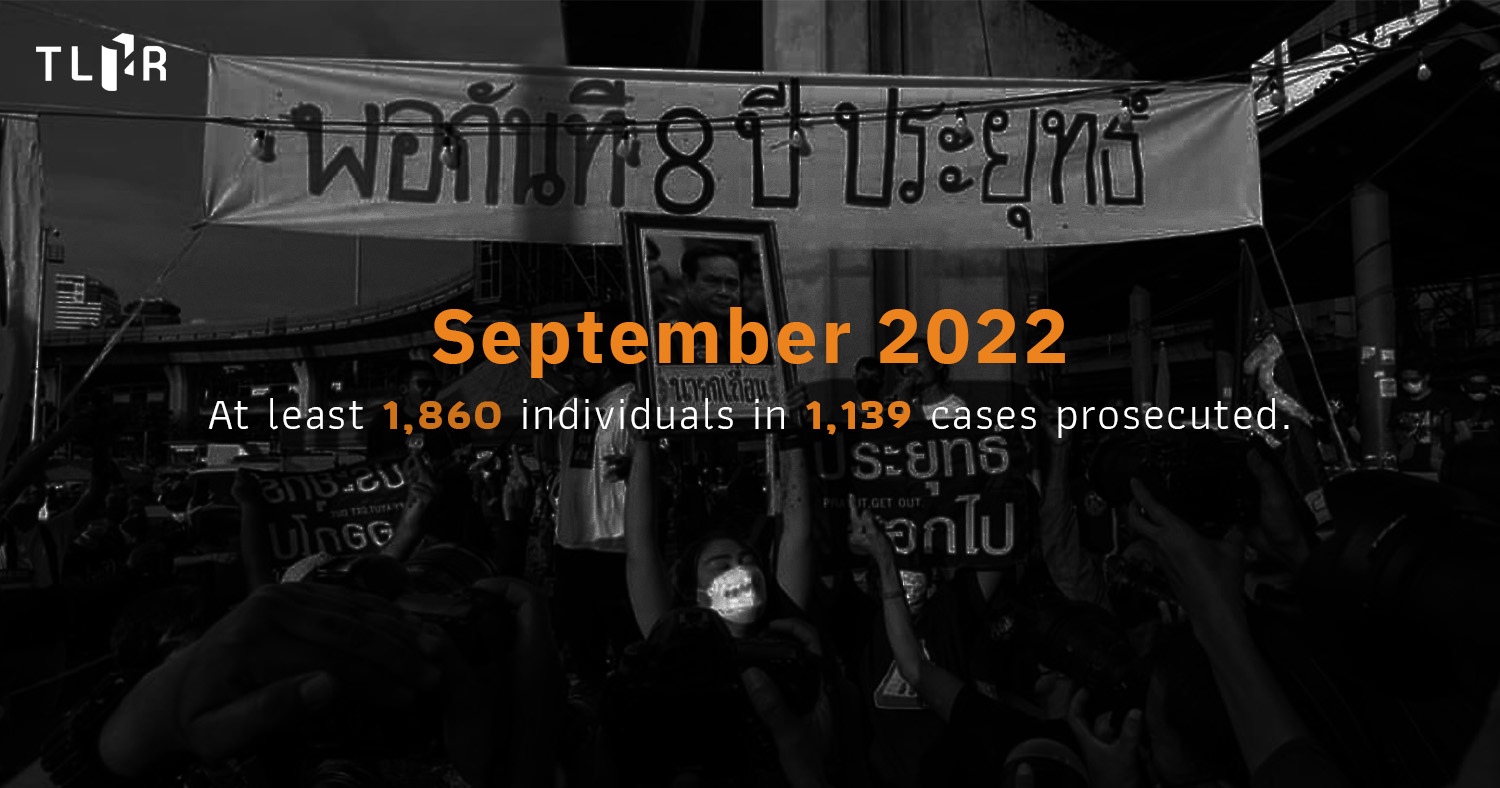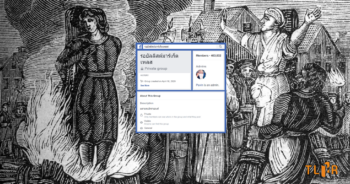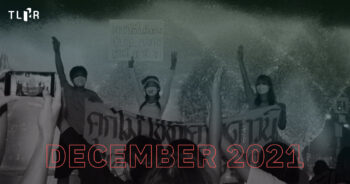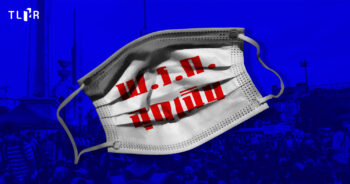At the end of September 2022, the cabinet approved the revocation of the Emergency Decree, which has been enforced for the past two and a half years. As a result, the public assemblies will be reverted to be subject to the Public Assembly Act. Nevertheless, the Emergency Decree cases associated with the past protests are still ongoing, despite the continuous trend of public prosecutors’ non-indictment orders and the court’s dismissals.
According to the TLHR statistics, at least 1,860 people in 1,139 cases have been prosecuted due to political participation and expression since the beginning of the “Free Youth Movement” rally on 18 July 2020 until 30 September 2022. Among this number are 283 youths under 18 years old. Compared to the end of August 2022, 7 people in 19 cases have been added to the statistics (only counting those never been charged before). Some cases had already occurred previously but have only come to TLHR’s attention now, or there has been a modification in the last month’s counting.
If we also count those who have been charged in multiple cases, we have found that there would be at least 3,704 incidents of prosecution in total.
The prosecution can be categorized according to key charges, as follows:
1. The “royal defamation or lèse-majesté” charge under Section 112 of the Criminal Code: at least 215 individuals in 234 cases.
2. The “sedition” charge under Section 116 of the Criminal Code: at least 127 individuals in 39 cases.
3. Charges of violation of the Emergency Decree: at least 1,468 people in 661 cases (since May 2020 when the first legal action against political protesters and activists was initiated).
4. Charges under the Public Assembly Act: at least 107 people in 75 cases.
5. Charges under the Computer Crime Act: at least 151 people in 171 cases.
6. Contempt of court charge: at least 36 people in 20 cases and insult to the court charge involving at least 27 people in 7 cases.
Out of the mentioned 1,139 cases, 248 have been concluded, 30 of which were not indicted by the public prosecutors. As such, 891 cases are still ongoing.
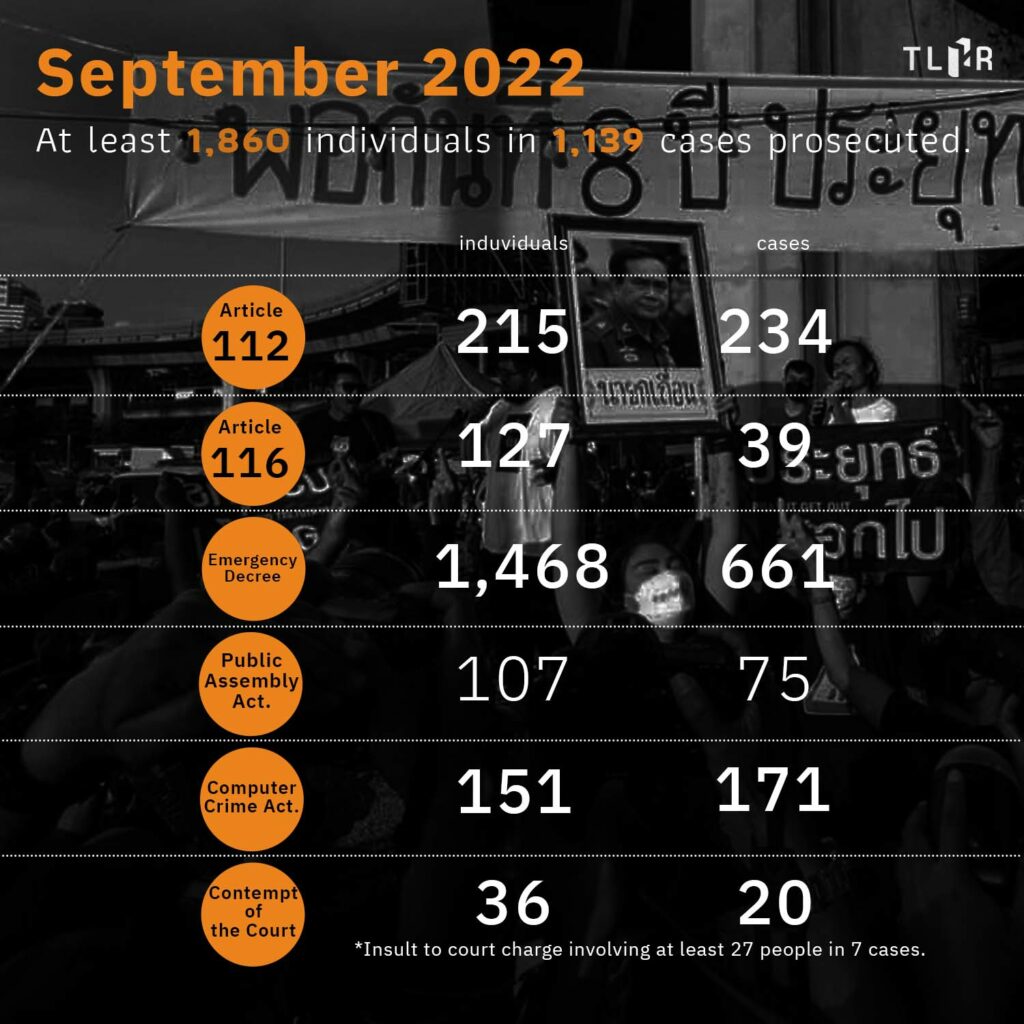
The prosecution trends in September 2022 observe the following key events:
Five more people have been prosecuted/detained in lèse-majesté cases. Verdicts have been issued for four more cases.
In September, no fewer than 215 people, as far as we know, were prosecuted with the lèse majesté in 234 cases. This is an increase of 5 people and 6 cases from last month, with at least two people in detention during trial.
A new case last month involves ‘Nui’ Waranya, an independent media creator, who was arrested because she joined others to sing songs by Fai Yen group during an anti-PM protest at the Victory Monument. This case was filed by “Tay Archeewa” at Phyathai Police Station. The police sought an arrest warrant directly without a summon warrant and brought the detainee to the Narcotics Suppression Bureau, which was not the responsible local police station. Later, the court granted bail to Nui.
In addition, TLHR has ben informed by the sub-committee of the House of Representatives tasked with exploring the impacts of the lèse majesté on the rights and freedoms of the people and media that there were concluded lèse-majesté cases involving five people accused during 2021 – 2022 and put behind bars in various locations. While the case details were unknown, they were certainly not cases that TLHR was aware of. Therefore, TLHR has added these five cases to the statistics.
Last month, the Court of First Instance issued verdicts of at least four lèse-majesté cases, with two of them having undergone defense. In one of the latter cases of ‘New’ Jatuporn accused of wearing a Thai dress to attend a fashion show activity on Silom Road, the Bangkok South Criminal Court held that the fact that the defendant had portrayed herself as the queen in a satirical and ridiculing manner was a disrespect to the monarchy, and sentenced her to a 3-year jail term, reduced to 2 years without suspension thanks to her cooperation during trial. Decided to appeal, New spent three days in detention while waiting for the bail approval.
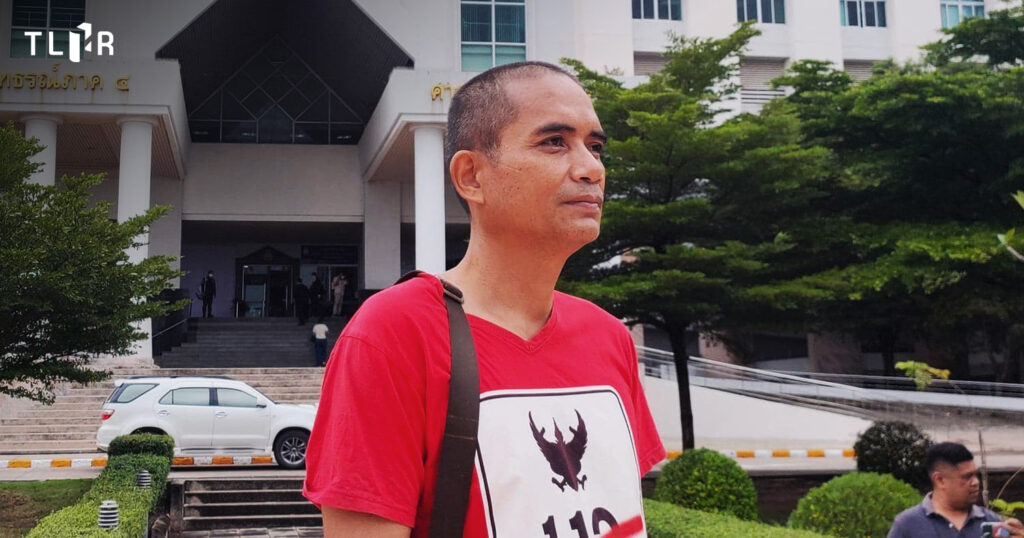
In the other case of Tiwagorn, who wore a t-shirt with the text “We have lost faith in the monarchy” and posted a picture of himself with the t-shirt on Facebook attached to the caption calling the monarchy to stop using the lèse majesté and the release of the four Ratsadon leaders, the Khon Kaen Provincial Court acquitted all charges, seeing that the defendant had not specified which king was referred to, and the monarchy as an institution did not constitute a component of a crime.
Given the verdicts that have been concluded so far, the direction of the interpretation of the law has become more evident. That is, referring to the institution of the monarchy as a whole and not to a specific person, as well as referring to previous kings, was not considered a component of a crime. With that being said, we still have to follow the decisions of higher courts in the coming time.
Meanwhile, there are two cases that the defendants who are only ordinary citizens confessed to committing such crimes. In such cases the court concluded with suspended sentence of imprisonment. These cases include the case of “Boonlue”, who shared opinions in an online conversation about the desirable qualifications of the king and the need to reform the monarchy, and the case of “Apsorn”, who shared Pavin Chachavalpongpun’s statement criticizing the Thai royal family, without writing any caption to it. The Phang-nga Provincial Court and the Criminal Court gave a three-year and four-year jail term for the two cases respectively but decided to suspend the punishment.

The state of emergency during Covid-19 has ended, yet protest cases are still ongoing despite non-indictment orders/acquittals
September marked the final declaration of a state of emergency to curb the spread of Covid-19, which was in effect for a total of two years, six months, and six days. Nevertheless, the cases related to political assemblies containing charges under the Emergency Decree did not terminate with it. There are still at least 574 cases that are ongoing at various stages in the judicial process (read the Summary of the Emergency Decree Cases).
As for the cases where defendants decided to defend, it was found that the courts have mostly dismissed them. In the past month, courts have further dismissed five cases, including the mobile car mob to submit letters to embassies, the protest on 17 October 2020 at Wong Wian Yai, the case of Pat who sold books and undergarments at the 2 May 2021 protest, case of Mimi, a youth, who was accused of making a speech at the 25 October 2020 protest, and the Future Park Rangsit car mob.
Meanwhile, one case of the 3 September 2021 protest at Ratchaprasong Intersection was ruled guilty by the court and received a sentence of fine. The court imposed fines of 20,000 Baht each on the two defendants who joined this protest. There fine was reduced to 13,333.33 Baht for testifying favorably in a trial.
In addition, it has been reported last month that three other Emergency Decree cases were not indicted by the public prosecutors: the case of 37 members of the “Chana Rak Thin” group who protested in front of the House of Government, the case of Chiang Rai car mob, and the case of observers of the Din Daeng protest on 3 September 2021.
Before September ended, the police also pressed charges under the Emergency Decree in several new cases: the four activists and citizens who joined the anti-Prayuth march from the Victory Monument to the House of Government on 23 – 24 August 2022 for the Prime Minister 8-year term, the five labor rights activists who advocated for a better quality of life for the workers and Prayuth’s resignation in front of the House of Government on 23 August 2022, and the two protesters who joined the 14 November 2021 protest to oppose the Constitutional Court’s decision on the abolition of the monarchy.
On a side note, Thai Lawyers for Human Rights has collected the statistics related to the 21 October 2020 protest, where 12 activists and citizens were accused of violating the declaration of a state of emergency. The incident was originally counted as one case. Later, however, it appeared that the public prosecutor has indicted the group individually in separate cases and the trials proceeded separately leading to various results from the courts. Therefore, 11 individuals have been added to the figures of the cases in this charge.
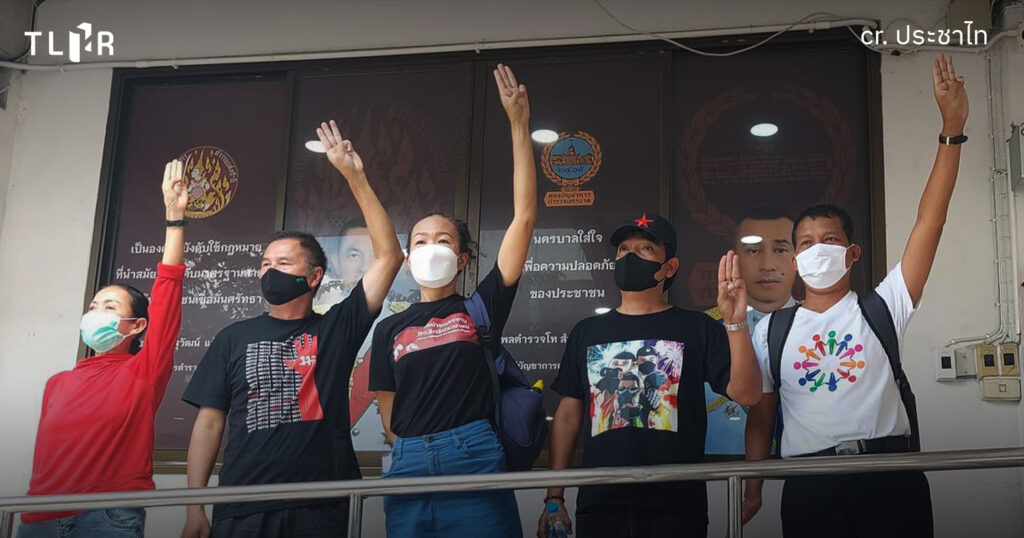
The role of public prosecutors in the non-indictment and termination of cases.
The legal proceedings against citizens who exercise their freedom of assembly and expression may likely be terminated by public prosecutors’ decision. Some cases have already received orders of non-indictment (at least 23 Emergency Decree cases), while many more are still in court.
Given that most of Emergency Decree violation cases have been steadily dismissed by the courts and the Covid-19 pandemic has ended, the prosecution in this manner can no longer benefit the public interest but burdens to both accused as well as judiciary personnel.
The public prosecutors have the option to dismiss all cases entirely by not indicting them or submitting withdrawal requests to the courts, an action which they are authorized to make by Section 21 of the Public Prosecution Organization and Public Prosecutors Act B.E. 2553 (2010).
In addition to the Emergency Decree violation cases in September, there is an example of a sedition case that was not indicted by the public prosecutor involving a member of the Democracy Restoration Group (DRG) accused of being the admin of the DRG group’s Facebook Page and posting to invite people to join the protest which later led to violence. The public prosecutor found that the evidence was vague and the statements expressed by the accused in the live broadcast were not in the scope of the component of crime under this section.
